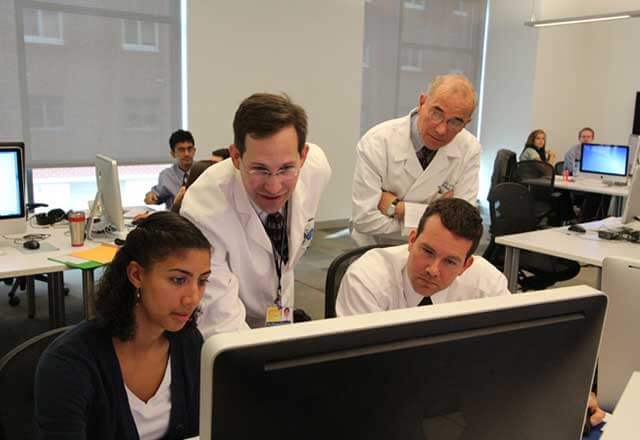Our Faculty

The Johns Hopkins School of Medicine is one of the top recipients of National Institutes of Health funding every year. We are also consistently ranked among the top medical schools in the nation by U.S. News & World Report. Our faculty members are leaders in their respective fields yet they all are devoted to training the next generation of biomedical experts, clinicians and researchers. Inspired by the founding vision of combining research, teaching with improving human health, they are dedicated to the future of medicine.
Awards and Recognitions
At Johns Hopkins, medicine compels us to strive to create a better, healthier life for current and future generations. Innovation is central to that promise, and the drive to discover is a shared commitment among faculty, students and staff. As an institution, we are fortunate to have some of the world's finest scientists, researchers and clinicians walking our halls and sharing their talents with our students in the lab, in the classroom and at patients' bedsides.
Recent Award Recipients and Honorees
Nobel Prize
Physician-scientist Gregg Semenza received the 2019 Nobel Prize in Physiology or Medicine for discovering how the body's cells sense and react to low oxygen levels. This discovery may lead to treatments for diseases such as cancer, diabetes and heart disease.
Carol Greider, Ph.D. became a Nobel laureate in 2009. Her discovery of telomerase-a remarkable enzyme that restores telomeres and protects them from damage-catalyzed an explosion of scientific studies that to this day probe connections between telomerase and telomeres to human cancer and diseases of aging.
National Academy of Sciences Inductees
- Professor Emeritus of Biological Chemistry Paul Englund, Ph.D. , was inducted into the NAS in 2012 for an illustrious research career dealing with the biology of the sleeping sickness parasite, the trypanosome.
- The laboratory of Rachel Green, Ph.D., Professor of Molecular Biology and Genetics, broadly focuses on the mechanism and regulation of protein production. Dr. Green was elected in 2012.
- The research of 2012 inductee Se-Jin Lee, M.D., Ph.D. , Professor of Molecular Biology and Genetics, focuses on understanding the role of signaling molecules in regulating embryonic development and adult tissue homeostasis.
Recent Institute of Medicine Inductees
- Johns Hopkins researcher Lawrence J. Appel, M.D., M.P.H. , has led a series of landmark studies that have set national standards for preventing heart disease, stroke and kidney disease, with both drug therapies and lifestyle modification. He was elected to the IOM in 2012.
- Also elected in 2012, Gregg Semenza, M.D., Ph.D., is best known for his groundbreaking discovery in the laboratory of hypoxia-inducible factor 1 or HIF-1, which helps cells cope with low oxygen levels. The discovery has far-reaching implications in understanding low oxygen health conditions like coronary artery disease and tumor growth.
MacArthur Fellows
The MacArthur Fellows Program awards unrestricted fellowships to talented individuals who have shown extraordinary originality and dedication in their creative pursuits and a marked capacity for self-direction. Recent School of Medicine faculty recipients include Peter Pronovost, M.D., Ph.D., Lisa Cooper, M.D., M.P.H. , Kay Redfield Jamison, Ph.D. and Geraldine Seydoux, Ph.D.
Research Highlights
As the life’s blood of Johns Hopkins, research here takes many forms. More than 80 percent of our basic-science faculty are working on National Institutes of Health grants, as are more than half of our clinical faculty as they investigate new approaches to diagnosis and treatment. But the current definition of research is even broader, with translational studies accelerating the rate at which new discoveries are able to help patients right now.
Here are just a few of our faculty’s recent discoveries:
- Led by Richard Huganir, Ph.D., Professor of Neuroscience at the School of Medicine, researchers have uncovered a protein switch that can either increase or decrease memory-building activity in brain cells, depending on the signals it detects. Its dual role means the protein is key to understanding the complex network of signals that shapes our brain’s circuitry.
- Scientists have long believed that healthy brain cells, once damaged by radiation designed to kill brain tumors, cannot regenerate. But new brain cell research on mice led by Professor of Neurosurgery Alfredo Quiñones-Hinojosa, M.D., suggests that neural stem cells, the body’s source of new brain cells, are resistant to radiation and can be roused to reproduce and replace injured cells.
- Lung transplant research. A team of Johns Hopkins researchers report that oversized donor lungs may be the best option for transplant patients, finding they are associated with a 30 percent increased chance of survival.
In fact, it is difficult to imagine any research topics that aren’t being explored at Johns Hopkins. With many of the world’s top scientists and physicians leading a group of very talented and motivated students in the labs and in the wards, how could we not be inventing the future of medicine?
